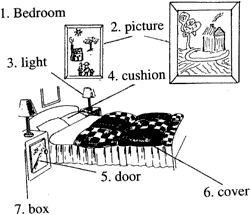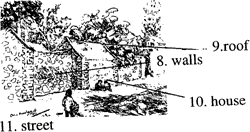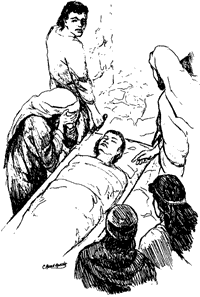Unit 13: Negatives
Pictured Words
New Words

| 1. bedroom
|
| 2. picture
|
| 3. light
|
| 4. cushion
|
| 5. door
|
| 6. cover
|
| 7. box
|

| 8. walls
|
| 9. roof
|
| 10. house
|
Nouns
Adjectives
Structure Words
Sayings
Is not this a poor house?
Let me see a new house, please.
There is one over there.
That one.
This is not a new house.
How much is it?
May I not put the light on?
The light is over there.
Has not the bed a nice cover?
Other forms of the negative
There are other ways of saying the negative.
In statements with the verb "to be" the word "not" may be put with it:
Am I not to get you a place?
Is there not Boaz?
These are negative questions.
If we make them into negative statements they would be:
I am not to get you a place
There is not Boaz
In each statement, "not" makes it negative.
Negatives with the verb "to have" also do the same thing as those with the verb "to be":
Naomi had a relation
Naomi had not a relation
These statements are opposites.
The first is positive and the second is negative.
Negative statements in the Present time (Tense) are made by using "do":
but do not let him see you
do not go back to your mother-in-law with nothing in your hands.

The Widow's Son
And it came about, after a little time, that he went to a town named Nain;
and his disciples went with him, and a great number of people.
Now when he came near the door of the town, a dead man was being taken out, the only son of his mother, who was a widow;
When the Lord saw her, he had pity on her and said to her, Be not sad.
And he came near, and put his hand on the stretcher where the dead man was: and those who were moving it came to a stop.
And he said, young man, I say to you, Get up.
And the dead man got up, and words came from his lips, And he gave him to his mother.
Fear came on all, and they gave praise to God, saying, A great prophet is among us: and, God has given thought to his people.
Additional Reading
The story of the Widow's Son comes to us from Luke who was a medical man and so we can think of his discussion as a responsible account of what took place there on that day.
In fact he makes use of some words which only a medical man could have knowledge of.
Even today, there is a place there for putting dead persons into holes among the rough stones and that is where the great number of people were going with the body of the dead boy.
The group would be loud in their cries and very sad, for that was usual with death.
It was the opinion of every one then that to put your touch on a dead man's carriage made you unclean, but Jesus did just that.
So everyone stopped, of course.
The place was near where the prophet Elisha gave new life to the boy that we had a story about in Unit 6: "On a Very Hot Day".
This miracle therefore had special value to persons there.
They would hold the story of Elisha very dear to them, and that would have been another reason why they were saying, "A great prophet is among us: and, God has given thought to his people".
The important point, however, is that the prophet Elisha stretched himself seven times on the body of the boy, but Jesus only said "Get up" and the boy sat up.
So, in the eyes of the people it was a much greater miracle.
Jesus was very kind.
The word that was made use of with respect to his feelings has the idea of "being deeply moved in his heart".
So this story gives us some idea of how truly kind he was.
He did this to give help to the widow who would be completely dependent upon her son for her needs.
He was not making himself seem important.
This story also has relation to a belief held by many people in those times.
They thought that God had no sense of feeling.
But, Jesus let it be known by his act that God was very conscious of the needs of men.
Helpful Notes
| pity
| having sadness of heart.
|
| miracle
| something not often seen.
|
| stretcher
| a thing to take rest on.
|
| responsible
| having a good relation with others.
|
| account
| saying a story.
|
| conscious
| having knowledge of the things around one.
|